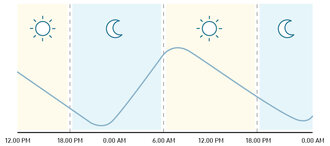Cortisol is a double-edged sword: although this stress hormone is a crucial part of our defenses against stress, increased cortisol levels over a prolonged period of time can have negative impacts on our health.
What is Cortisol and where is it produced?
Cortisol is a chemical messenger naturally produced by the body (a hormone) that is produced in the adrenal cortex with the help of cholesterol. Although it plays an exceptionally wide range of roles in our body, cortisol is best known as a stress hormone.
What happens during stress? And what does cortisol do?
When we have a hectic day, are facing an important exam, or we feel threatened in any way, our bodies respond with an evolutionary instinct known as “fight or flight”. This triggers the release of stress hormones. Adrenaline and noradrenaline form the rapid response team, while cortisol shows up in a supporting role around 20 minutes later.
Effects
Cortisol increased... | Cortisol decreased... |
|
|
Daily Cycle
Blood cortisol levels follow a natural daily rhythm. After falling overnight, they peak in the early morning hours to launch the waking-up process and help us get ready for the day. Once we're up, our cortisol levels gradually fall again.

Cortisol level
Cortisol Reference Values: Blood, 8 AM: 119 – 618 nmol/l; Saliva, morning: 1,800 – 14,500 pg/ml
What happens when stress increases or decreases cortisol levels?
Many of us suffer from stress these days. Stress that we can neither fight nor flee. These often intangible, long-term burdens keep our cortisol levels high, disrupting our natural, daily rhythm, and can throw both body and mind off course.
- Metabolism In fight-or-flight situations, increased cortisol levels are invaluable. They make increased energy available by allowing blood sugar levels to rise and mobilizing fatty acids. If they remain elevated for longer periods, the body also draws proteins from the muscles. However, if this new energy supply isn't used (e.g. because we are feeling stressed out while “only” sitting at the computer), these resources are deposited in our fat cells – meaning that our love handles grow while our muscles “waste away”.
- Sleep. Long-term stress also disrupts our circadian rhythm. The “good morning” cortisol peak may flatten, making it harder to get out of bed, while if we lie down at night with increased cortisol levels, we sleep poorly – this, in turn, again weakens our ability to withstand stress.
- Very low cortisol levels = total relaxation? Appearances can be deceiving! In extreme cases, heavy loads of long-term stress can not only burden our adrenal glands but even overburden them until they run out of steam. This not only impacts our performance and motivation, it also lowers our ability to withstand stress.
How does stress affect the immune system?
Who hasn’t felt stressed out at some stage? You’re running around like a blue-arsed fly and then – the final straw – you catch a cold. What sounds like “Murphy's Law” is not just a coincidence, but the direct interaction between stress and the immune system, which is felt up close here. While acute stress stimulates the immune system, chronic stress is debilitating. In this case, the cortisol released has an immunosuppressant effect. Under constant stress, the number of granulocytes decreases, the natural killer cells are less active and even the number of B and T lymphocytes decreases.
How can I lower stress-related cortisol levels?
- Micronutrients have your back. Plentiful stores of vitamin B can help keep your nerves and capacities in top condition during a hectic day. Together with the anti-stress mineral magnesium, which reduces the release of cortisol during stress, and essential fatty acids, which can also lower the cortisol level, micronutrients are important companions in times of stress. (Blog: Fighting stress with nutrition).
- Listen to your gut. Our intestines play an important role in managing stress. A good balance in our intestinal flora not only supports our resistance to stress, certain strains of bacteria in the gut can even help reduce stress hormone levels, including cortisol. (Product: fit@work® Stressbiotic)
- Immerse yourself in nature. The smell of grass, the sound of leaves rustlingand birds singing can be relaxing.Allowing Mother Nature to work her magic on you for 20 to 30 minutes per day, three times a week, (without cell phones, conversations, sports or email) can be a successful, all-natural way to lower your cortisol levels.
- Awaken your Inner yogi. Yoga is both fun and a good way to de-stress. A study showed that nurses who practiced yoga for half a year were significantly less stressed.
Sleep your stress away. Raised cortisol levels can disrupt our ability to fall asleep and stay asleep. Without the rest we need, our resistance to stress is lower the next day. It's a vicious cycle. To break it, make sleep a priority and consider taking melatonin.
Did you know that elevated cortisol levels could harm your bikini body?
Our relationship to food is not the only thing that changes when we're under stress. The stress hormone cortisol that circulates in our body also affects our metabolism, making our blood sugar levels rise so that fatty acids are released from our fat cells. What's more, if our cortisol levels remain elevated for a prolonged period of time, our body also draws protein from our muscles to create energy. When this energy is released and not used – for example, if we are stressed out while simply sitting at our desk – the excess energy is then deposited into our fat cells. In other words, chronically elevated cortisol levels will transform our muscles into love handles!
Literature available from the author.
https://pubmed.ncbi.nlm.nih.gov/28178022/
https://www.ncbi.nlm.nih.gov/pmc/articles/PMC5471632/









